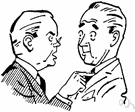an·tag·o·nist
(ăn-tăg′ə-nĭst)n.
1. One who opposes and contends against another; an adversary.
2. The principal character in opposition to the protagonist or hero of a narrative or drama.
3. Physiology A muscle that counteracts the action of another muscle, the agonist.
4. A drug or chemical substance that interferes with the physiological action of another, especially by combining with and blocking its receptor.
an·tag′o·nis′tic adj.
an·tag′o·nis′ti·cal·ly adv.
American Heritage® Dictionary of the English Language, Fifth Edition. Copyright © 2016 by Houghton Mifflin Harcourt Publishing Company. Published by Houghton Mifflin Harcourt Publishing Company. All rights reserved.
antagonistic
(ænˌtæɡəˈnɪstɪk)adj
1. in active opposition
2. mutually opposed
anˌtagoˈnistically adv
Collins English Dictionary – Complete and Unabridged, 12th Edition 2014 © HarperCollins Publishers 1991, 1994, 1998, 2000, 2003, 2006, 2007, 2009, 2011, 2014
an•tag•o•nis•tic
(ænˌtæg əˈnɪs tɪk)adj.
1. acting in opposition; opposing, esp. mutually.
2. ready to be hostile; unfriendly.
[1625–35]
an•tag`o•nis′ti•cal•ly, adv.
Random House Kernerman Webster's College Dictionary, © 2010 K Dictionaries Ltd. Copyright 2005, 1997, 1991 by Random House, Inc. All rights reserved.
ThesaurusAntonymsRelated WordsSynonymsLegend:
| Adj. | 1. |  antagonistic - indicating opposition or resistance antagonistic - indicating opposition or resistancenegative - characterized by or displaying negation or denial or opposition or resistance; having no positive features; "a negative outlook on life"; "a colorless negative personality"; "a negative evaluation"; "a negative reaction to an advertising campaign" |
| 2. |  antagonistic - characterized by antagonism or antipathy; "slaves antagonistic to their masters"; "antipathetic factions within the party" antagonistic - characterized by antagonism or antipathy; "slaves antagonistic to their masters"; "antipathetic factions within the party"hostile - characterized by enmity or ill will; "a hostile nation"; "a hostile remark"; "hostile actions" | |
| 3. | antagonistic - arousing animosity or hostility; "his antagonistic brusqueness"; "Europe was antagonistic to the Unites States" conciliative, conciliatory - intended to placate; "spoke in a conciliating tone"; "a conciliatory visit" | |
| 4. |  antagonistic - used especially of drugs or muscles that counteract or neutralize each other's effect antagonistic - used especially of drugs or muscles that counteract or neutralize each other's effectinteractive, synergistic - used especially of drugs or muscles that work together so the total effect is greater than the sum of the two (or more) | |
| 5. |  antagonistic - incapable of harmonious association antagonistic - incapable of harmonious associationincompatible - not compatible; "incompatible personalities"; "incompatible colors" |
Based on WordNet 3.0, Farlex clipart collection. © 2003-2012 Princeton University, Farlex Inc.
antagonistic
adjective hostile, opposed, resistant, at odds, incompatible, set against, averse, unfriendly, at variance, inimical, antipathetic, ill-disposed Nearly all the women were antagonistic to the idea.
Usage: A useful synonym for antagonistic, for example in public opinion is antagonistic to nuclear energy, is averse. However, this alternative should be used with care as a very common error is to confuse it with adverse. Averse is usually followed by to and is meant to convey a strong dislike or hostility towards something, normally expressed by a person or people. Adverse is wrong in this context and should be used in relation to conditions or results: adverse road conditions.
Collins Thesaurus of the English Language – Complete and Unabridged 2nd Edition. 2002 © HarperCollins Publishers 1995, 2002
antagonistic
adjectiveActing against or in opposition:
The American Heritage® Roget's Thesaurus. Copyright © 2013, 2014 by Houghton Mifflin Harcourt Publishing Company. Published by Houghton Mifflin Harcourt Publishing Company. All rights reserved.
Translations
مُخاصِم، مُعادِ، مُعارِض
antagonistickýnepřátelský
fjendtlig
fjandsamlegur
antagonic
protichodný
antagonistic
[ænˌtægəˈnɪstɪk] ADJ1. (= hostile) [person, attitude] → hostil, antagonista
2. (= opposed) [ideas, views] → antagónico, opuesto
I am not in the least antagonistic to the idea → yo no me opongo en lo más mínimo a la idea
I am not in the least antagonistic to the idea → yo no me opongo en lo más mínimo a la idea
Collins Spanish Dictionary - Complete and Unabridged 8th Edition 2005 © William Collins Sons & Co. Ltd. 1971, 1988 © HarperCollins Publishers 1992, 1993, 1996, 1997, 2000, 2003, 2005
antagonistic
[ænˌtægəˈnɪstɪk] adj [attitude, feelings] → hostile; [relationship] → antagoniste; [person] → hostileto be antagonistic towards sb/sth → être hostile à qn/qch
Collins English/French Electronic Resource. © HarperCollins Publishers 2005
antagonistic
adj reaction, attitude → feindselig; force → gegnerisch, feindlich; interests → widerstreitend, antagonistisch; to be antagonistic to or toward(s) somebody/something → jdm/gegen etw feindselig gesinnt sein
Collins German Dictionary – Complete and Unabridged 7th Edition 2005. © William Collins Sons & Co. Ltd. 1980 © HarperCollins Publishers 1991, 1997, 1999, 2004, 2005, 2007
antagonistic
[ænˌtægəˈnɪstɪk] adj → antagonistico/aCollins Italian Dictionary 1st Edition © HarperCollins Publishers 1995
antagonist
(ӕnˈtӕgənist) noun an opponent or enemy.
anˈtagonism noun unfriendliness, hostility.
anˌtagoˈnistic adjectiveanˌtagoˈnistically adverb
anˈtagonize, anˈtagonise verb
to make an enemy of (someone). You are antagonizing her by your rudeness.
Kernerman English Multilingual Dictionary © 2006-2013 K Dictionaries Ltd.